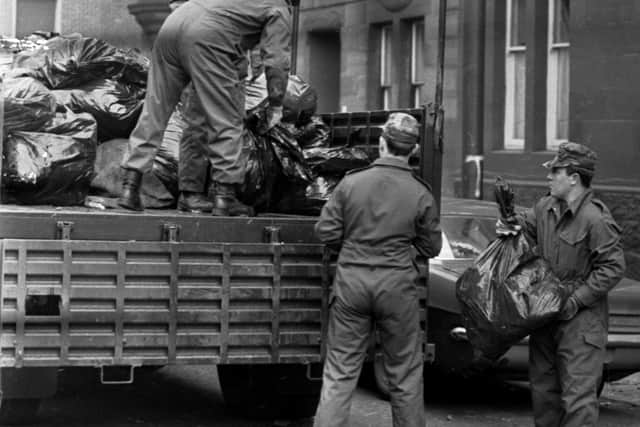Remembering the Glasgow bin strikes of 1975, as new industrial action begins this month
and live on Freeview channel 276
As the bin strikes began in Glasgow on Wednesday 24 August - we look back at the Glasgow Dustcart Worker’s strike of 1975, where rubbish piled high in the streets of Glasgow.
The unofficial strike began when 350 Glasgow bin lorry drivers on 6 January 1975 entered an unofficial strike - following a disagreement in the interpretation of a previous settlement from a months-long strike by the national dustcart drivers union in October of 1974.
Advertisement
Hide AdAdvertisement
Hide AdAt that time - around 7000 tonnes of rubbish required collection around Glasgow each week - and as the strike went on into February, refuse began to pile up in Glasgow a
In early March, the then Labour Government called in the army to remove refuse - with the chief medical officer at the time citing the risk of the rubbish posing a serious health hazard to the public.


It was the first time that the military was used in an industrial dispute since 1950 - over 1500 soldiers took to the streets to try and tackle over 70000 tons of rubbish rotting across Glasgow in the early Spring.
A picket line had been set up at the new (at the time) incinerator in Maryhill - but was eventually broken by the Royal Highland Fusiliers.
Advertisement
Hide AdAdvertisement
Hide AdThe army at the time were viewed by many in the public as undermining the striking cleansing workers - whereas others were happy to see the streets clean of rubbish after 13 long weeks of strike action.
Soldiers began work on 19 March and removed around 39000 tons of rubbish before the strikers returned to work on 14 April.
The strikes - that ran for more than four months - led to a significant increase in the amount of rats in the city amidst the mountains of rubbish - and a much higher rat population after the strikes had concluded and the rubbish had been cleared.
Army soldiers were treated to an extra 50p a day for their new job - and were filmed fighting rats the size of cats with shovels and boots.
Advertisement
Hide AdAdvertisement
Hide AdIn 1974, dustcart drivers (or scaffies, or the clenny as they were known locally at the time) were paid a basic wage of £32.50 - in contrast Heavy Goods Vehicle (HGV) drivers in the private sector were paid £37.
In 2022, according to Glassdoor, a wage for a Bin Man for Glasgow City Council can range from £17000 to £24000 - with HGV drivers in Glasgow today making a range of £19000 to £35000 per year.
Comment Guidelines
National World encourages reader discussion on our stories. User feedback, insights and back-and-forth exchanges add a rich layer of context to reporting. Please review our Community Guidelines before commenting.
